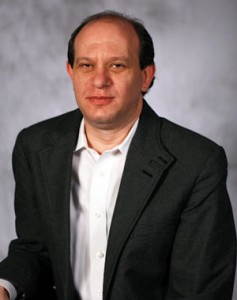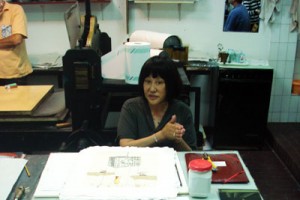UHCL faculty receive marks of excellence
Mary Ann Wangler
The Signal Staff
Five University of Houston-Clear Lake faculty members received awards recognizing distinguished services and outstanding teaching.
“University of Houston-Clear Lake has always had outstanding faculty members who are dedicated to providing a quality education to our students, supporting community initiatives and conducting scholarship in their respective disciplines,” said President William Staples. “I’m never surprised to hear that they are being honored for their hard work and dedication, and I am always proud to be surrounded by such talented professionals.”
Innovative teaching techniques
Daniel Silvermintz, assistant professor of humanities, was awarded the Jerry G. Gaff Faculty Award for Outstanding Teaching in General and Liberal Studies.
“The Gaff award is a national award offered by the Association for General and Liberal studies, which is looking at interdisciplinary curriculum and first year programs like the basic texts sequence,” Silvermintz said. “I think they were particularly excited about some of the innovated exercises that I do in that class.”
The Humanities program nominated Silvermintz because of his innovative mock trial of Socrates during his Basic Texts in the Western Tradition class.
Silvermintz has his students assume rolls and “try” Socrates on the same charges from 399 B.C.
“Every year that I have been teaching basic text [the trial] is a highlight of the semester,” Silvermintz said. “It is a way to synthesize everything we have done up to that point in the class. I’m always looking for ways to make students active participants in the class. The more active someone can become in the learning process, the more they are going to get out of the class.”
Silvermintz received his award in October at the 49th annual Association for General and Liberal Studies, which was held in St. Louis.
A distinguished alumna gives back
The Barrios Technology Faculty Fellowship Endowment in the School of Science and Computer Engineering was awarded to Jack Lu, professor of chemistry and department chair, and Lei Wu, professor of software engineering.
“We are trying to make something new that can be used in long duration space flight and in low temperature storage, and can be used to detect low bio-markers,” Lu said.
Lu’s research is in aerospace application and he plans to use the fellowship to support that research.
“Basically, for research education related to aerospace research, like research presentations,” Lu said. “Go to a conference, buy some research supplies.”
Wu’s research is in Robotic and Intelligent Remote Security with the overall goal to make a “self-maintained, autonomous and interactive home security model.”
“It will strengthen my professional development in creating a combination of software engineering and embedded system engineering, thus to further develop the capability of securing external funding from national academic funds agencies, and it will enrich the software engineering program by introducing real-life applied research projects into the program, and further enhance the program curriculum development,” Wu said.
This is the first year for the Barrios Technology Fellowship, which was established by Sandra G. Johnson, president of Barrios Technology. Johnson is a distinguished alumna of UHCL.
The fellowship provides funding for one year.
A Fulbrighter
Sandria Hu, professor of art, is a five-time Fulbright recipient. Her latest award allowed her to go to Belgrade, Serbia, for two weeks in September/October to teach her chine colle printmaking technique.
The Fulbright is designed to “increase mutual understanding between the people of the United States and the people of other countries.”
Participants are chosen for their academic merit and leadership potential.
Funding for the Fulbright Program primarily comes from an annual appropriation made by the Congress to the Department of State.
Hu’s first Senior Fulbright Scholar Fellowship was for a one-year stay in Czechoslovakia and her second was to Slovakia for six months. The Fulbright Scholar Fellowship requires a long-term stay of six months to one year. Her third Fulbright Scholar Fellowship was to Mexico.
“You’re only allowed to have two full Fulbrights long-term, ever, but they gave me three, because the people in Mexico really needed me for six months.
Hu then qualified as a Senior Fulbright Specialist, which givers her the opportunity to teach in another country for two weeks. Her fourth Fulbright was to Mexico again.
Hu, and UHCL, is part of an art consortium that includes several other universities from around the country and world. Hu takes artwork from these other universities with her on the Fulbright trips to display while she is teaching.
Hu travels all over the world teaching her printmaking technique, bringing students and instructors back to the states, and taking students and instructors with her to promote art.
“Because of the Fulbright I had with Mexico, I am going back to Mexico again in March; not with the Fulbright, but because of my connections with Mexico through the Fulbright,” Hu said. “If it wasn’t for the Fulbright I wouldn’t have had that long-term exposure and connections and collaboration.”
“The whole goal for everything I’ve done, if it is involving international – whether going abroad or bringing people back here – is international dialogue and collaboration,” Hu said.
Distinguished service
Mary E. Stafford, associate professor of psychology, was awarded the International School Psychology Association 2009 Award for Distinguished Services.
ISPA serves members within the school psychology profession. It brings together people from all over the world and helps developing nations with establishing and maintaining school psychology programs in kindergarten through 12th grade schools.
“It meant a lot to me to get this award,” Stafford said.
Stafford has been an active and dedicated member of ISPA since 1991. She was asked to chair the Ethics Committee for ISPA in the late ‘90s and held the position for several years.
“[The Ethics Committee’s] goal is to provide standards for which school psychologists around the world can aspire to,” Stafford said.
“I tried to get people to think about times when they felt very uncomfortable. That’s when there is an ethical dilemma,” Stafford said. “Then let’s talk about those things and how we can resolve those things.”
In 2007 Stafford took over as editor of the ISPA newsletter and made it more dynamic by reaching out to other members in various countries to get them to provide material over what they are experiencing in their home countries.
“I will solicit articles about what is going on in school psychology around the world,” Stafford stated.
“Mary Stafford is a person who can always be relied on,” said Helen Bakker, ISPA president, at Stafford’s award presentation. “Her example and involvement is a model to us all in ensuring that ISPA remains a relevant and active organization for its members.”







Comments are closed, but trackbacks and pingbacks are open.